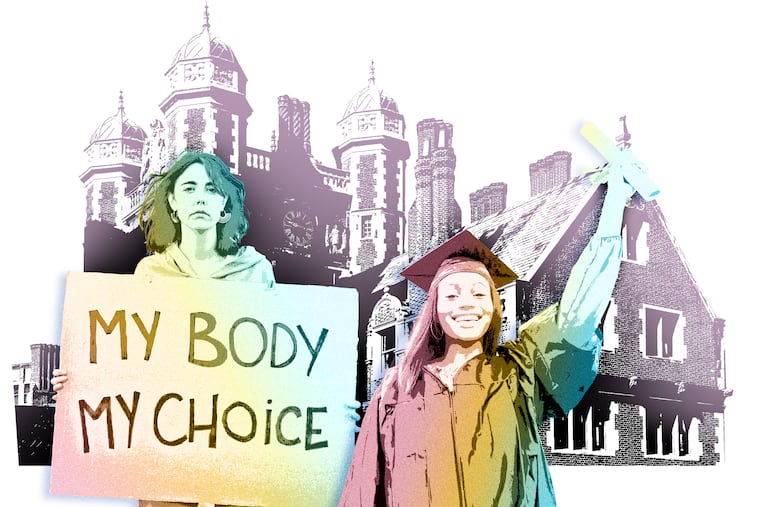Many students applying to colleges are avoiding states that don’t support abortion rights
"I barely looked into schools in states where I thought my rights weren’t protected," one high school senior said.

Increasing numbers of young women applying to colleges are avoiding schools in states that ban or severely restrict abortion, according to polls, scholarly research, and interviews with Philadelphia-area students, their families, and college consultants.
“This is one of the big issues for us,” said Rosanna Kahn, 48, an MBA student at Drexel University, and the mother of a 20-year-old daughter who’s a sophomore studying public health at Gwynedd Mercy University in Montgomery County. “My daughter was very concerned about abortion access when she applied to schools.
“If, heaven forbid, she were to get pregnant, she and I know we need to be around here, where she can quickly get it taken care of and move on with her life, rather than be living in some place that puts stringent restrictions on women.”
That sentiment was echoed by a 17-year-old Montgomery County high school senior who asked that her name not be used to protect her privacy. Like many students, she’s currently in the midst of the application season, which concludes in early winter.
“When I was cultivating my list of possible schools,” she said, “I thought about attending Rice University [in Houston], but I crossed it off. I didn’t want to sacrifice my rights to an abortion by living in Texas.
“After that, I barely looked into schools in states where I thought my rights weren’t protected. I eliminated Florida, then Alabama, and Louisiana.”
‘Sensitive’ to policies
Research published earlier this month in Economics Letters, a scholarly journal, shows that in 2021, there was a one percentage point decrease in the share of female undergraduates applying to colleges in states where abortion is banned or heavily restricted, compared with states in which abortion remained more accessible.
“This suggests that undergraduate applicants are sensitive to state reproductive health policies,” the article read.
The decline preceded the U.S. Supreme Court’s overturning of Roe v. Wade in June 2022, ruling that the Constitution doesn’t confer a right to abortion.
“Students were anticipating the Dobbs [v. Jackson] decision that ended Roe before it even happened,” article coauthor Rajiv Sharma, an economist at Portland State University, said in an interview. “The writing was on the wall.”
In a July poll by Intelligent.com, a college-search website, 26% of prospective college students said they’d consider attending a school only in a state where abortion is legal. Other polls showed similar leanings.
College counselors in the Philadelphia area say they’re seeing the effect of Dobbs.
“State abortion rights are something my [high school] juniors and seniors are talking to me about a lot,” said Stacey Cunitz, owner of Blue Moon Educational Consulting in Mount Airy. “The mothers especially are speaking with me.
“After Ohio voted for abortion protections earlier this month, I had one mother say to me, ‘O.K., Oberlin [College] is back on the list!’ ”
Cunitz added that she also works with several LGBTQ students who are worried about moving to states with anti-transgender laws.
“These are often the same as the antiabortion states,” she said.
Jennifer Schlegel, co-owner of My Admissions Sherpa, a college counseling business in Malvern, has been dealing with similar concerns.
“Typically I get requests from the mothers: Avoid red states with ultraconservative culture,” she said.
Schlegel intervened when a young woman wrote her college essay about how she’d led a pro-choice walkout at her school. “She was applying to a Southern school,” Schlegel said. “I said, ‘No, you can’t write that.’ ”
Avoiding Florida colleges
Quite often, students from the area are saying they won’t go to any school in Florida, said Joan Koven, an educational consultant with Academic Access in Havertown. The state’s supreme court is considering a ban on abortion after six weeks of pregnancy.
“But it’s not only abortion down there,” she said. “It’s banned books, problems with DEI [diversity, equity, and inclusion], how they teach history, and the legislature.”
Rebecca Davis, a historian of sexuality at the University of Delaware, said that friends with transgender children are so concerned about Florida, “they won’t even let their kids have connecting flights through there.”
Along with young women, some men applying to colleges also carefully consider Florida or any other Southern state “because of the current political climate in general,” said Linda Hollenback, owner of Hollenback Consulting, a college advising firm in Willow Grove.
“They’re concerned more broadly about the ability to have dialogue with others on any hot topic,” she said.
However, counselors said, they haven’t encountered men who’ve expressed concern over a state’s stance on abortion.
“That has never come up at all,” Korden said. Cunitz concurred: “It should be an issue for everyone, but the burden falls on the women. Men especially don’t think of it as their issue.”
Conservative families with kids applying to college also express apprehension about the roiling social environment.
“Rather than worry about the state’s laws, however,” said Cunitz of Blue Moon, “these parents — usually the dads — don’t want their children to go to individual schools considered hotbeds of liberalism.”
According to counselors, young people who’ve grown up in this region are accustomed to what they described as “progressive” attitudes toward abortion.
“But that could be different if I went to school in another state with restrictions,” said a 17-year-old junior who’s being advised by Cunitz.
“It’s hard to be thinking about living in a state where your rights aren’t valued and people aren’t listening to women’s voices. That would feel a lot less safe.
“That’s a really scary thought.”